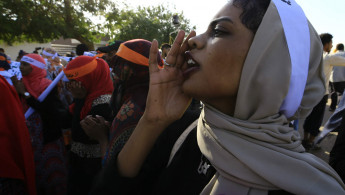Sudan activists decry slow progress on women's rights since Bashir's fall
Bashir was toppled by the military in April last year following a popular uprising but 11 months on, little progress has been made to remedy nearly three decades of oppression faced by women under his regime.
"Nothing has been done to meet women's demands," Zeineb Badreddine, an activist involved in the protest movement from its onset in December 2018, told AFP.
Badreddine will lead a demonstration in front of the Justice Ministry in Khartoum on Sunday to mark International Women's Day.
The activist also works as a teacher - a profession she was forced to leave after being fired in the early years of Bashir's rule for her "progressive ideas".
The transitional government lacks female representations, Badreddine said.
When Prime Minister Abdalla Hamdok took office in September, he promised to improve the situation for women despite the country's economic and social difficulties.
He allocated four of 17 ministerial positions to women, including the key foreign affairs portfolio. A woman was also named head of the judiciary.
But the country's top authority, the joint military-civilian sovereign council charged with overseeing the transition to civilian rule, only has two female members out of 11.
"If women had better representation, they would have more voices to defend their cause," Badreddine explained.
Discriminatory laws remain
|
|
Under Bashir's regime, a notorious "public order" law was used to have women publicly flogged or imprisoned over "indecent and immoral acts" such as "indecent" dress or drinking alcohol. Even wearing jeans in public could incur a punishment.
Hamdok's government last November revoked the legislation - but many other discriminatory laws remain in place.
Badreddine condemned a lack of legislation criminalising sexual harassment.
Judges in Sudan also have powers to judge whether or not a woman has been raped, which can sometimes lead to rape victims being prosecuted for adultery.
Lawyer and women's activist Inaam Atiq takes aim at a 1991 personal status law, which she says "is causing the suffering of thousands of women across Sudan".
She says the legislation allows girls as young as 10 to be married against their wishes.
"This text must be urgently amended and this can be done without touching Sharia [Islamic law] principles," she said.
Another law forbids women to travel abroad unless they have permission from a male guardian - a measure that even ultra-conservative Saudi Arabia has abolished in the past year.
"My guardian could be a younger brother that I raised, or even my son," explained Atiq.
Nor do courts specialising in personal status issues consider the results of DNA tests, allowing Sudanese men to shirk parental responsibilities and compounding women's problems, she added.
Activist Manal Abdelhalim expresses amazement at "voices, including those of some women, who say that the issue [of women's rights] is not a priority and that it can wait".
But Atiq is more hopeful.
"We need immediate measures, and I think that the justice ministry and the government understand the situation," she said.
"I am optimistic about the possibility of taking steps in the right direction."
 |
| Click here to read more of our special coverage for International Women's Day |





 Follow the Middle East's top stories in English at The New Arab on Google News
Follow the Middle East's top stories in English at The New Arab on Google News
![Israeli forces ordered bombed Gaza's Jabalia, ordering residents to leave [Getty]](/sites/default/files/styles/image_330x185/public/2176418030.jpeg?h=a5f2f23a&itok=_YGZaP1z)

